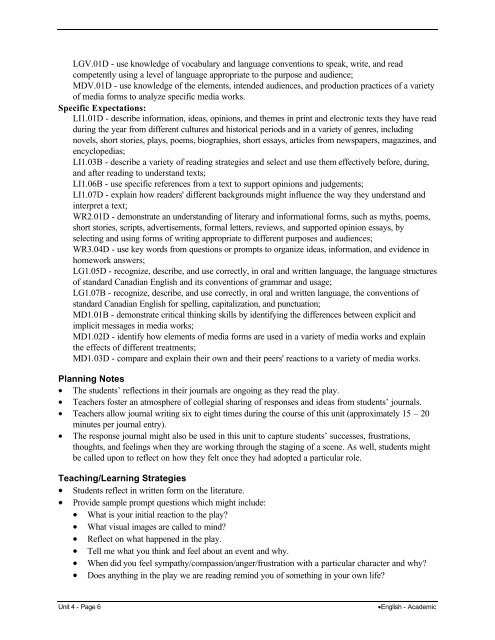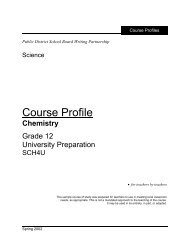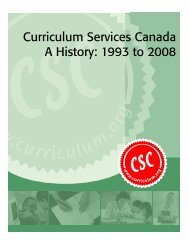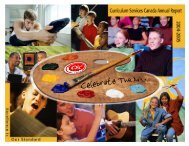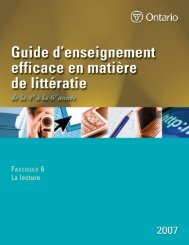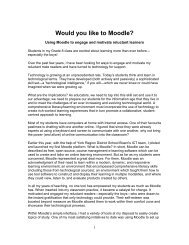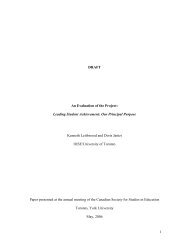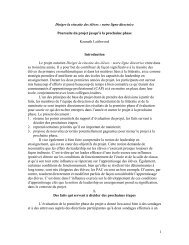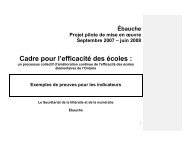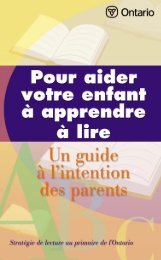Course Profile - Curriculum Services Canada
Course Profile - Curriculum Services Canada
Course Profile - Curriculum Services Canada
Create successful ePaper yourself
Turn your PDF publications into a flip-book with our unique Google optimized e-Paper software.
LGV.01D - use knowledge of vocabulary and language conventions to speak, write, and read<br />
competently using a level of language appropriate to the purpose and audience;<br />
MDV.01D - use knowledge of the elements, intended audiences, and production practices of a variety<br />
of media forms to analyze specific media works.<br />
Specific Expectations:<br />
LI1.01D - describe information, ideas, opinions, and themes in print and electronic texts they have read<br />
during the year from different cultures and historical periods and in a variety of genres, including<br />
novels, short stories, plays, poems, biographies, short essays, articles from newspapers, magazines, and<br />
encyclopedias;<br />
LI1.03B - describe a variety of reading strategies and select and use them effectively before, during,<br />
and after reading to understand texts;<br />
LI1.06B - use specific references from a text to support opinions and judgements;<br />
LI1.07D - explain how readers' different backgrounds might influence the way they understand and<br />
interpret a text;<br />
WR2.01D - demonstrate an understanding of literary and informational forms, such as myths, poems,<br />
short stories, scripts, advertisements, formal letters, reviews, and supported opinion essays, by<br />
selecting and using forms of writing appropriate to different purposes and audiences;<br />
WR3.04D - use key words from questions or prompts to organize ideas, information, and evidence in<br />
homework answers;<br />
LG1.05D - recognize, describe, and use correctly, in oral and written language, the language structures<br />
of standard Canadian English and its conventions of grammar and usage;<br />
LG1.07B - recognize, describe, and use correctly, in oral and written language, the conventions of<br />
standard Canadian English for spelling, capitalization, and punctuation;<br />
MD1.01B - demonstrate critical thinking skills by identifying the differences between explicit and<br />
implicit messages in media works;<br />
MD1.02D - identify how elements of media forms are used in a variety of media works and explain<br />
the effects of different treatments;<br />
MD1.03D - compare and explain their own and their peers' reactions to a variety of media works.<br />
Planning Notes<br />
• The students’ reflections in their journals are ongoing as they read the play.<br />
• Teachers foster an atmosphere of collegial sharing of responses and ideas from students’ journals.<br />
• Teachers allow journal writing six to eight times during the course of this unit (approximately 15 – 20<br />
minutes per journal entry).<br />
• The response journal might also be used in this unit to capture students’ successes, frustrations,<br />
thoughts, and feelings when they are working through the staging of a scene. As well, students might<br />
be called upon to reflect on how they felt once they had adopted a particular role.<br />
Teaching/Learning Strategies<br />
• Students reflect in written form on the literature.<br />
• Provide sample prompt questions which might include:<br />
• What is your initial reaction to the play?<br />
• What visual images are called to mind?<br />
• Reflect on what happened in the play.<br />
• Tell me what you think and feel about an event and why.<br />
• When did you feel sympathy/compassion/anger/frustration with a particular character and why?<br />
• Does anything in the play we are reading remind you of something in your own life?<br />
Unit 4 - Page 6<br />
•English - Academic


